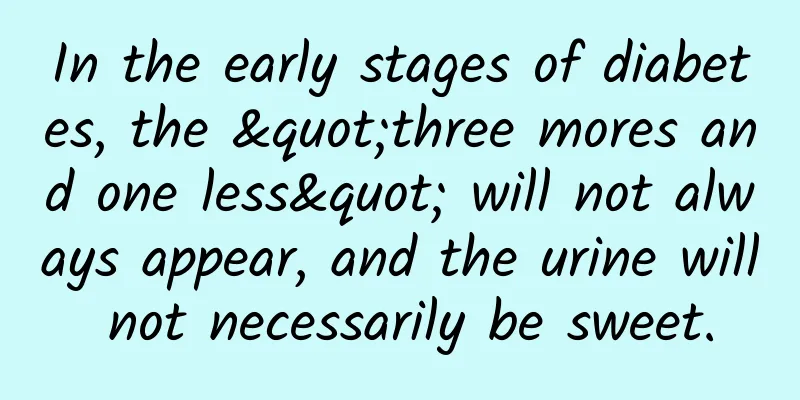In the early stages of diabetes, the "three mores and one less" will not always appear, and the urine will not necessarily be sweet.

|
A friend told Huazi that during his physical examination, his fasting blood sugar exceeded 7.0mmol/L, which has reached the diagnostic criteria for diabetes. He asked Huazi, isn't it said that diabetes will have "three mores and one less" symptoms? But after he was diagnosed with high blood sugar, he didn't feel any discomfort, and even secretly tasted his own urine, but it didn't taste sweet. Is this also considered diabetes? 1. What is the basis for diagnosing diabetes? Huazi told him that the normal blood sugar level of a human body is 3.9~6.0mmol/L. If the fasting blood sugar level exceeds or is equal to 7.0mmol/L, or the blood sugar level at any time is greater than or equal to 11.1mmol/L, or the blood sugar level 2 hours after a grape tolerance test is greater than or equal to 11.1mmol/L, as long as one of the above conditions is met, the patient can be diagnosed with diabetes. Before doing a blood sugar test, you need to eat normally within a week and avoid high-sugar foods to avoid interference with the measurement results. When testing fasting blood sugar and random blood sugar, you need to measure them on two different days, and pay attention to avoid the influence of stress factors such as infection and injury to get relatively accurate measurement results. 2. Not all people with diabetes will have "three mores and one less". The typical symptoms of diabetes are "three mores and one less". "Three mores" refer to eating more, drinking more, and urinating more, and "one less" refers to weight loss. The typical symptoms of diabetes are more common in patients with type 1 diabetes, but not all patients with type 2 diabetes will have the symptoms of "three mores and one less". Many patients with type 2 diabetes only experience dizziness and fatigue in the early stages of the disease, which are very similar to ordinary fatigue. Some patients even have no symptoms, which are very easy to be ignored. Some patients in the pre-diabetes stage will show obvious hunger, palpitations, dizziness, cold sweats and other symptoms of hypoglycemia before meals (such as before lunch and dinner) due to the disorder of blood sugar regulation. Although diabetes is named "diabetes", it does not necessarily mean that there is sugar in the urine. The name "diabetes" is used because in the 1670s, British doctor Thomas William found that the urine of patients with this disease "tastes like sugar and honey", hence the name. Glucose is an important energy source for the human body. The renal tubules reabsorb 100% of glucose, so normal people's urine does not contain sugar. For patients with early diabetes, the blood sugar level is not very high, and there is no sugar in the urine. When glycosuria occurs, it means that the blood sugar level has exceeded the reabsorption capacity of the renal tubules, and the condition is often more serious at this time. Therefore, diabetes cannot be diagnosed by whether or not there is glycosuria, but blood sugar should be used as the diagnostic standard. 4. What to do after getting diabetes? Insulin is the hormone responsible for lowering blood sugar, and diabetes is a metabolic disease characterized by high blood sugar. There are two causes of the disease: 1. The islet cells of the pancreas lose their function, resulting in an absolute lack of insulin secretion. This type of diabetes is called type 1 diabetes. 2. The pancreatic islet function is still good, but the body's tissue cells become less sensitive to insulin, resulting in insulin resistance and relatively insufficient insulin secretion. This type of diabetes is called type 2 diabetes. For patients with type 1 diabetes, blood sugar can only be controlled by injecting exogenous insulin, which is also called insulin-dependent diabetes. For patients with type 2 diabetes, blood sugar can be controlled through a variety of methods, such as diet adjustment, increased exercise, oral hypoglycemic drugs, and insulin injections. Most patients with type 2 diabetes have both causes. And as the duration of illness increases, it will gradually progress from "mainly insulin resistance with insufficient insulin secretion" to "mainly insufficient insulin secretion with insulin resistance". However, diabetes is not terrible, but the various complications caused by high blood sugar. As long as active treatment and good control of blood sugar are taken, the occurrence of complications can be prevented. To sum up, to judge whether you have diabetes, you cannot look at whether the symptoms of "three mores and one less" appear, nor can you look at whether the urine is sweet, but the blood sugar level should be used as the standard. Even if you have diabetes, as long as you actively control your total calorie intake and weight and insist on aerobic exercise, you can reduce insulin resistance, delay the progression of the disease, prevent the occurrence of complications, and will not affect life expectancy and quality of life. I am pharmacist Huazi, welcome to follow me and share more health knowledge. |
>>: I can’t sit for a long time, can’t I just stand?
Recommend
What to do with breast cystic nodules?
In real life, more and more female friends cannot...
38 weeks pregnant back pain
Women who are 38 weeks pregnant should be conside...
I found out I was pregnant after taking a chest X-ray.
Key reminder: In daily life, some women need to t...
Children always fall down when walking? The reason is actually this......
Many parents think that it is normal for children...
How long does it take for the cervix to open after it flattens?
For the vast majority of pregnant women who choos...
What color of latex paint is suitable for a small living room? What color of latex paint is good for a small living room?
We all know that the living room is an important ...
Symptoms of left lumbar nephritis in women
If a woman has nephritis, she must be careful in ...
What does chocolate represent? The correct way to eat chocolate
Whenever a festival comes, chocolate is chosen as...
How to treat postpartum disease
Regarding postpartum sickness, Chinese medicine b...
Blood in urine after menstruation
If you experience blood in your urine after your ...
Is there no handling fee for ticket refunds during the 2020 Spring Festival? When will the waiver of ticket refund fees begin?
After the official announcement of the free refun...
Is it easy for the second child to be born prematurely?
Many women choose to have a second child because ...
How to treat female breast hyperplasia?
Many women often have some breast pain. In additi...
How to take care of the baby in the most scientific way after a normal birth
The fetus stays in the pregnant woman's belly...
How often should I have a prenatal checkup after 34 weeks?
34 weeks is the late stage of pregnancy. You can ...









